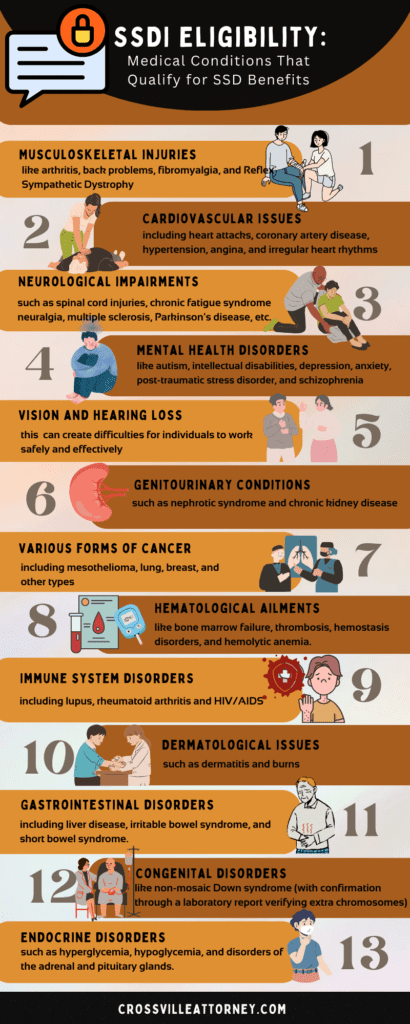What Type of Injuries Do Social Security Consider?

In situations where an illness or injury severely impacts your work capabilities, you could qualify for benefits through Social Security Disability Insurance (SSDI). The Social Security Administration maintains an extensive list of health conditions that could potentially be deemed disabilities, contingent on their severity. Any applicant seeking SSDI must show substantial medical evidence demonstrating the disabling nature of their condition.
According to data from the United States Office of Social Security, in 2011, around 9.8 million individuals were given social security disability benefits. Approximately 89% of recipients being disabled workers. The average age of disabled workers benefiting from these provisions was 53, and the majority of recipients were male. Most recipients of disability benefits suffered from disabilities related to musculoskeletal and connective tissues, as well as mood disorders.
If you or a loved one is facing a similar situation, it’s vital to assess whether pursuing an SSD claim is suitable. Social Security disability benefits can offer crucial financial assistance to individuals unable to work due to a disability. Nevertheless, the process of seeking these benefits can be intricate and frustrating. This is why seeking the guidance of an experienced SSD attorney in Tennessee is advisable.
Eligibility for Social Security Disability
The purpose of Social Security Disability benefits is to offer crucial financial support to individuals incapable of working due to a disability. However, navigating the application process for these benefits can be intricate and discouraging. The majority of initial SSD claims and even first appeals are often denied.
To be eligible for Social Security Disability benefits, specific criteria must be met. Essential prerequisites include having a qualifying medical condition that aligns with the Social Security Administration’s disability definition, typically involving a condition anticipated to persist for a minimum of one year or result in death. Also, a sufficient work history with contributions to the Social Security system is necessary to qualify for SSD benefits.
Medical Conditions That Qualifies You for SSDI Benefits
The Social Security Administration has compiled a Blue Book that outlines a catalog of medically significant disability or conditions which they deem sufficiently severe to cause disability and hinder an individual from engaging in work. After careful analysis of the disabilities documented in the SSA’s Annual Statistical Report on the Social Security Disability Insurance Program from 2018 here are the prevalent disabilities.
- Musculoskeletal injuries, like arthritis, back problems, fibromyalgia, and Reflex Sympathetic Dystrophy, can significantly impact an individual’s work capacity, particularly if their job involves prolonged standing, walking, or sitting.
- Cardiovascular issues, including heart attacks, coronary artery disease, hypertension, angina, and irregular heart rhythms, can lead to breathlessness and chest pain, making it difficult to perform physical labor or even manage extended periods of desk work.
- Neurological impairments such as spinal cord injuries, chronic fatigue syndrome neuralgia, multiple sclerosis, Parkinson’s disease, cerebral palsy, and epilepsy can result in mobility difficulties and pain that hinder engagement in physically demanding professions.
- Mental health disorders like autism, intellectual disabilities, depression, anxiety, post-traumatic stress disorder, and schizophrenia can undermine an individual’s functioning and their ability to carry out work-related duties, potentially leading to an inability to continue in their current job.
- Vision and hearing loss can create difficulties for individuals to work safely and effectively, particularly in roles that rely on keen eyesight or hearing.
- Genitourinary conditions, such as nephrotic syndrome and chronic kidney disease.

- Various forms of cancer, including mesothelioma, lung, breast, and other types.
- Hematological ailments like bone marrow failure, thrombosis, hemostasis disorders, and hemolytic anemia.
- Immune system disorders, including lupus, rheumatoid arthritis and HIV/AIDS.
- Dermatological issues such as dermatitis and burns.
- Gastrointestinal disorders, including liver disease, irritable bowel syndrome, and short bowel syndrome.
- Congenital disorders affecting multiple body systems, like non-mosaic Down syndrome (with confirmation through a laboratory report verifying extra chromosomes).
- Endocrine disorders such as hyperglycemia, hypoglycemia, and disorders of the adrenal and pituitary glands.
Even if your medical condition isn’t listed in the Blue Book, there’s still a chance of qualifying for SSDI. To be eligible, you must prove that your condition aligns with the disability definition and holds comparable severity to the ones listed in the Blue Book.
What Conditions Automatically Qualify You for Disability?
Certain health conditions mentioned above might make you eligible for disability benefits without the need for a lengthy review process. In cases where your disability is particularly severe, you could qualify for a compassionate allowance. This accelerates the process, allowing you to receive disability payments promptly instead of waiting for the standard approval procedure.
Furthermore, you might automatically meet the requirements for SSDI if you have:
- Amyotrophic lateral sclerosis (Lou Gehrig’s disease)
- Muscular dystrophy
- Cardiovascular disorders
- Endocrine ailments
- Cancer
A social security disability attorney can evaluate your situation and ascertain whether your condition warrants automatic disability qualification. Burnett Law will guide you through the disability application process and provide advice regarding the essential documentation to substantiate the seriousness of your condition.
What Should You Do if You Have a Disability?
If you have a disability that prevents you from working, you could potentially qualify for SSDI. SSDI offers financial support to address both you and your family’s financial needs. Substantiating your medical condition and work background is crucial. You must have accumulated sufficient work hours within roles covered by Social Security.
Enlisting the help of Burnett Law Social Security Disability attorney can be beneficial for your claim. In the event of a denial from the SSA, an attorney can guide you through the appeals process. It’s advisable not to presume ineligibility without consulting with a lawyer beforehand.
Contact An Experienced Tennessee Social Security Disability Lawyer
Different kinds of injuries exist that may qualify you for SSD benefits. Maneuvering through the intricate application procedure can be perplexing and difficult. In fact, the majority of individuals who apply independently tend to face denials.
If you require assistance with your SSD claim in Tennessee, Burnett Law is here to help. We have over 26 years of experience in helping the hurting. Getting you the benefits you need to live a normal life is personal to us.
We are equipped to offer you the necessary direction and assistance to secure the benefits you’re entitled to. Contact us at (931) 484-7549 for a free consultation.
Disclaimer: The information contained in this blog or on this website is provided for informational purposes only, and should not be construed as legal advice on any specific subject matter. No person should act or refrain from acting due to any content included in the site without seeking legal or other professional advice on the particular facts and circumstances at issue from an attorney licensed in the person’s state. The Firm expressly disclaims all liability in respect to actions taken or not taken based on any or all the contents of this blog or website.
Burnett Law
Search Posts
Recent Posts
- SSDI: Why Do I Need An Attorney? May 23, 2025
- Car Accidents: Types of Damages October 22, 2024
- Car Accidents: Demystifying Legal Jargon August 9, 2024
- How to Choose the Right Personal Injury Attorney After a Motorcycle Crash January 16, 2024
- Navigating Insurance Claims After a Car Accident: A Step-by-Step Guide January 9, 2024
Categories
Subscribe!
Thanks for subscribing! Please check your email for further instructions.
